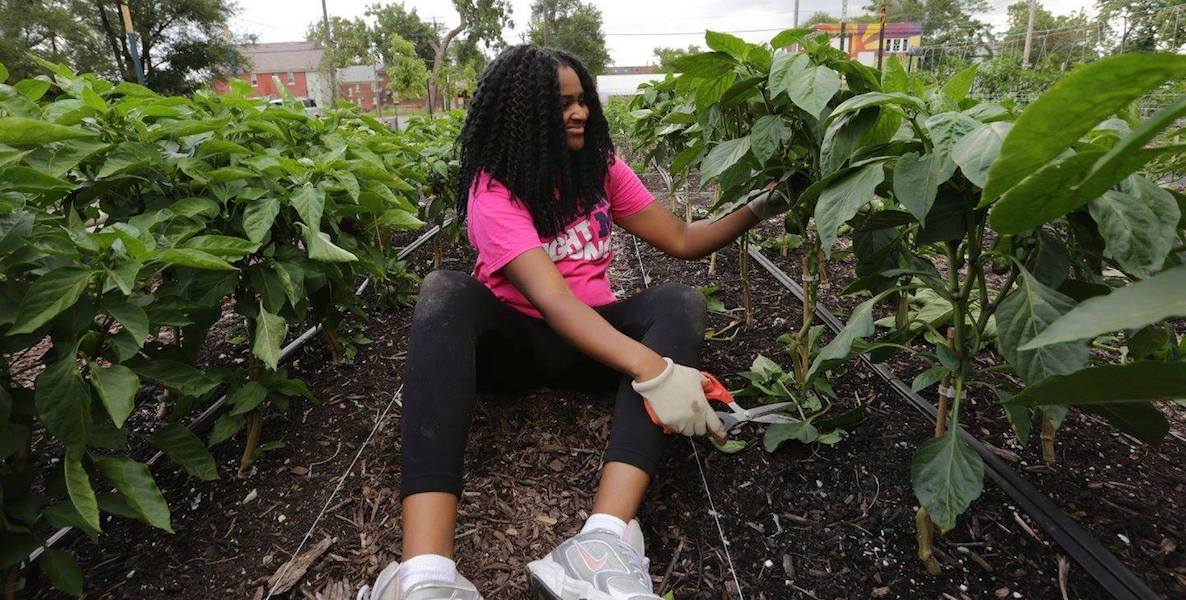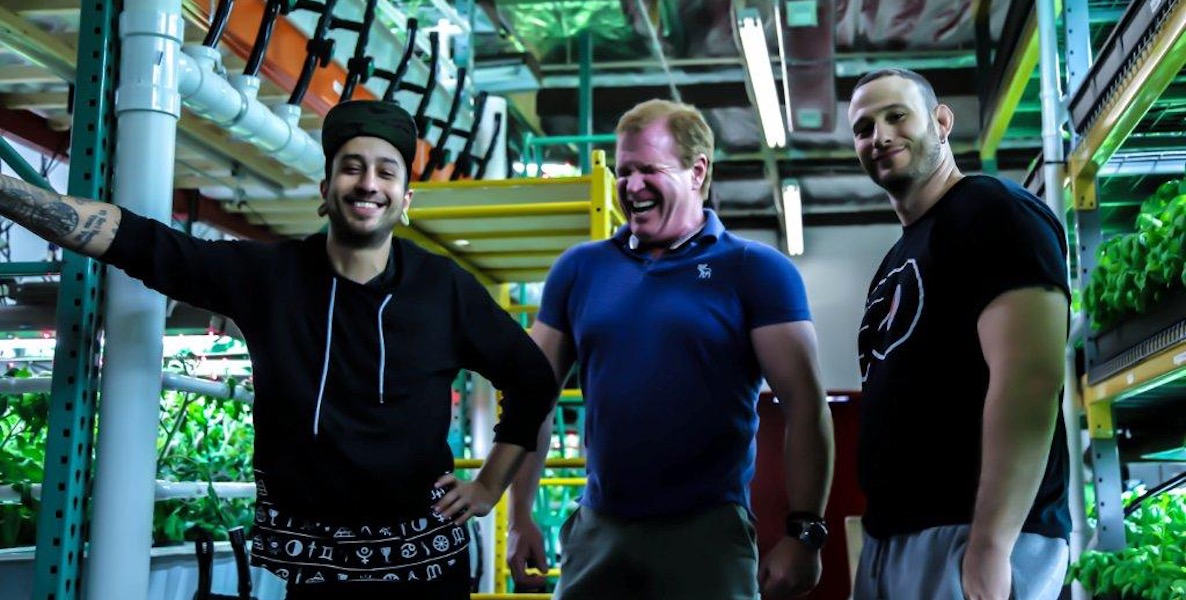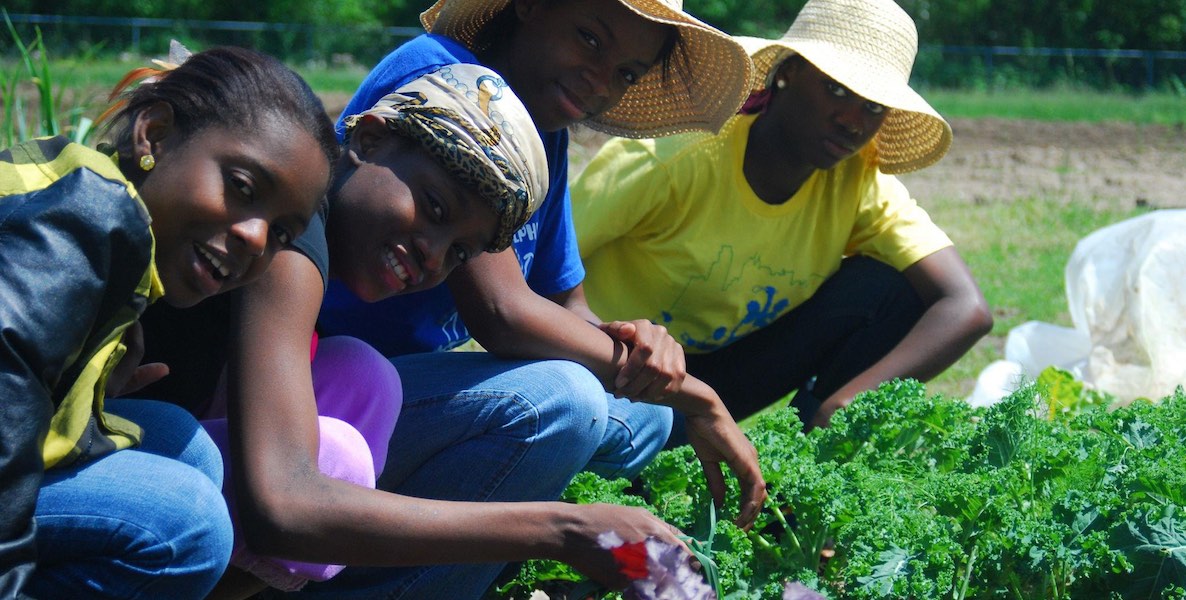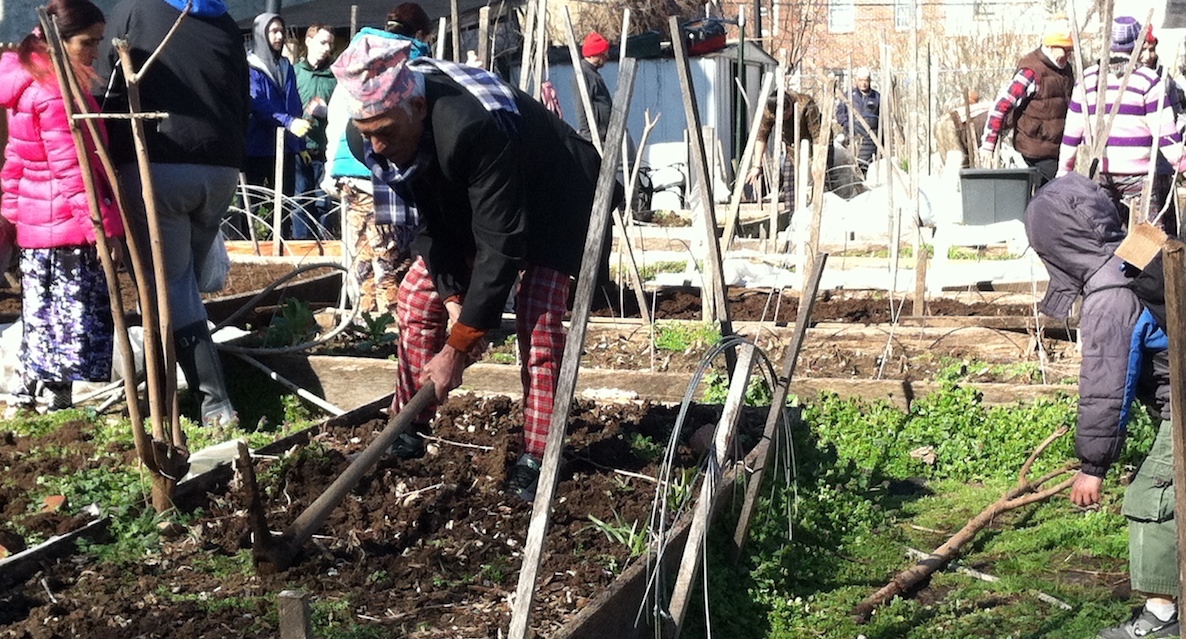Mon Gurung, a Bhutanese refugee who moved to South Philly with her family several years ago, has had to adjust to a lot. Bhutan, in the Himalayas, is tiny; its largest city, Thimphu, has fewer people than Allentown. It’s also among the most agrarian nations in the world—with 60 percent of the workforce in farming—as is Nepal, where many Bhutanese fled to avoid ethnic cleansing of Nepali-Bhutanese in the 90s. That’s where Gurung spend most of her life, around farmers.
Like many Bhutanese, Gurung’s family came to Philly seeking economic improvement and a chance to find themselves as more than just refugees—and they achieved both. But Gurung, like other immigrants, also lost something: Their agrarian identity, a piece of Bhutanese culture that is fading from view with every generation.
Now, Gurung is recapturing that piece of her culture at a small community garden at 8th and Emily streets, run by the Refugee Urban Agricultural Initiative, part of the Nationalities Services Center. “The garden is very important for our culture,” Gurung says. “I think we need it.”
The Refugee Urban Garden in South Philly takes up half the block, with more than 100 plots over 7,000 square feet. On a recent Saturday, dozens of people are weeding and planting and fostering seedlings. Several of the mostly Bhutanese immigrants working the land are employees, trainee farmers of the Nationalities Services Center and the Pennsylvania Horticultural Society. All of the gardens at “Growing Home” are maintained by immigrants, who pay $25 a month for their own plots.
Known as “Growing Home,” the Emily Street plot is one of two gardens run by the NSC; the other, at 25th and Reed in Point Breeze, is called “Growing Together.” They are among the organization’s more ambitious initiatives. Mostly, the NSC acts as a sort of resettlement agency for new immigrants coming to Philly, including refugees and asylum seekers; it contracts out English language training and job services, and provides pro bono legal representation and help with asylum applications. The gardens are an entirely different sort of service for the advocacy group—but it’s one that has been a vital outreach and expansion tool, ever since they first broke ground in 2011.
“We were working with a lot of refugees who had been farmers before they came to the United States, and it was a way for them to connect with their culture and former professions in ways that they hadn’t before,” says Ellen Ramage, who runs the gardens for the NSC. “When they came to the U.S., it was a way to teach their children what they’d learned and done.”
The idea for Growing Home came from refugees themselves. Many had come from Bhutan or Nepal, while their children were born stateside, and had never had an introduction to the agrarian lifestyle of their people. Hell, they’d never even tended a garden. The generational gap is growing at a massive clip, and the divide between Philly kids and their parents and grandparents—some of whom don’t even speak English—couldn’t be wider in some cases.
In garden plots, NSC saw a chance to build those cultural connections, and also add a whole new dimension to their career training services. The NSC offers a three-year training program for aspiring immigrant farmers who help manage the gardens on both sides of Broad Street, while receiving technical agrarian training. Farming per se may not be the most realistic career for a Philadelphian, but agrarian training can arm a student with, at the very least, the ability to run their own self sustaining garden, and at most work in the larger business of agriculture.
Folks who are enrolled in NSC’s agricultural training program are entitled to a stipend, and have to put in at least 50 supervised hours per month, some at the gardens, some in classes and at conferences; they also get to bring fresh produce home to their families. At its Entrepreneurial Garden site opened last year, refugees with some experience in farming are also experimenting with different ways to grow vegetables, particularly those hard to find in Philly. The eventual goal is for them to be able to sell those crops, for additional income.
“We were working with a lot of refugees who had been farmers before they came to the United States, and it was a way for them to connect with their culture and former professions in ways that they hadn’t before,” says Ellen Ramage, who runs the gardens for the NSC. “When they came to the U.S., it was a way to teach their children what they’d learned and done—albeit, of course, on a smaller scale.”
The garden also introduces something vital to the homes of new immigrants: fresh produce. The South Philly neighborhood where Growing Home is located isn’t technically a food desert. Buying produce from the neighborhood supermarket, however, is no easy task; the Acme at Passyunk and Reed is expensive, only a few local corner shops offer fresh food, and even fewer offer the kinds of produce that make up their Southeast Asian diet.
“The food stamp budget is about $5 per day, and when these folks first come to the U.S., their average wage is about $9 per hour,” says Ramage. “And on top of that, when they come to the U.S., their local stores might not sell the kind of produce they’re used to eating, or want to eat. It’s a way not only to connect with activities they knew—it’s a way for them to grow the food that they know.”
Hence, Growing Home.Get it?
The mix of produce that comes out of the NSC’s gardens certainly is international, as the growers have a say in what’s planted. Ramage says that there are participants from Nigeria, Cambodia, Nepal and Bhutan. They’ve recently grown African eggplant—a Congolese favorite—as well as Bangkok hot peppers (the good stuff), a plant called ‘sour sour’ and bitter melon. While cultural comfort food items are widely enjoyed, it’s the staples that get the most play. (“I’d say that the tomatoes are the most popular,” says Ramage.)
“The food stamp budget is about $5 per day, and when these folks first come to the U.S., their average wage is about $9 per hour,” says Ramage. “And on top of that, when they come to the U.S., their local stores might not sell the kind of produce they’re used to eating, or want to eat. It’s a way not only to connect with activities they knew—it’s a way for them to grow the food that they know.”
After a few years, the program became so popular that it had a 300-person waitlist. The group’s expansion to Point Breeze was therefore a matter of necessity; the NSC currently borrows the space from Church of the Redeemer Baptist, and opened up the plots in 2014. The Point Breeze garden is open to community members who aren’t part of the NSC, as well; its members include refugees from Bhutan, Congo and Burma, as well as parishioners and Point Breeze residents. And even with the expansion, Ramage says that the program is nearly unsustainably popular.
“We currently have a big waiting list, so demand is definitely exceeding supply. Part of it is that our clients want to take part, and part of it is that urban farming is just a very trendy thing right now,” says Ramage.
Ramage says that she’s unsure of what future the Refugee Urban Agricultural Initiative is going to be, but that further expansion is the last thing on her mind. Since taking over the initiative two years ago, Ramage has had to learn on the fly. She’s no farmer herself, a north Jersey girl by birth and a non-profit office-type by training, but she’s come to love the work.
“There’s always something happening,” she says.
Header photo courtesy of Growing Home.






